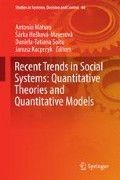Abstract
An emergent higher-level property is ‘nonvacuously weak’ if it is specified both in terms of the manifest and latent powers of its constituents. The manifest powers are always in action, while the latent ones are activated only when lower-level entities interact into a specific configuration. After the exploration on whether the belief in emergentism is justified and possible, I motivate why nonvacuously weak emergence seems to be a valid candidate. Then I argue that this structural variety of emergence is explanatory reducible, but is not ontologically reducible, to its lower-level composing elements. I close by arguing that this could be the variety that secures a consistent hybrid social theory.
Access this chapter
Tax calculation will be finalised at checkout
Purchases are for personal use only
References
Achim, S.: Armchair Arguments against Emergentism. Erkenntnis 46, 305–314 (1997)
Archer, M.S.: Realist Social Theory: The Morphogenetic Approach. Cambridge University Press, Cambridge (1995)
Bedau, M.: Weak emergence. In: Tomberlin, J. (ed.) Philosophical Perspectives: Mind, Causation and World, vol. 11, pp. 375–399. Blackwell, Malden MA (1997)
Bedau, M.: Downward causation and the autonomy of weak emergence. Principia 6, 5–50 (2003)
Bhaskar, R.: A Realist Theory of Science. Leeds Book, Leeds (1975)
Broad, C.D.: Mind and its Place in Nature. Routledge & Kegan Paul, London (1925)
Chalmers, D.J.: The Conscious Mind: in Search of a Fundamental Theory. Oxford University Press, New York (1996)
Corry, R.: Emerging from the Causal Drain. Philos. Stud. 165, 29–47 (2013)
Dennett, D.: Real Patterns. J. Philos. 87, 27–51 (1991)
Durkheim, E.: The Rules of Sociological Method (trans. by Hall, W.D.) McMillan Press, London (1982)
Elder-Vass, D.: Top-down Causation and Social Structures. Interface Focus 2, 82–90 (2011)
Elder-Vass, D.: The Reality of Social Construction. Cambridge University Press, Cambridge (2012)
Giddens, A.: Central Problems in Social Theory. McMillan, London (1979)
Kim, J.: ‘Downward Causation’ in Emergentism and Nonreductive Physicalism. In: Beckermann, A., Flohr, H., Kim, J. (eds.) Emergence or Reduction?, pp. 119–138. de Gruiter, Berlin (1992)
Kim, J.: Making sense of emergence. Philos. Stud. 95, 3–36 (1999)
Ladyman, J., Lambert, J., Wiesner, K.: What is a complex system? Eur. J. Philos. Sci. 3(1), 33–67 (2013)
Le Boutillier, S.: Emergence and analytical dualism. Philosophica 71, 59–80 (2003)
Le Boutillier, S.: Emergence and reduction. J. Theor. Soc. Behav. 43, 205–225 (2013)
O’Connor, T., Wong, H.Y.: The metaphysics of emergence. Nous 39(4), 658–678 (2005)
Papineau, D.: The rise of physicalism. In: Loewer, B. (ed.) Physicalism and its Discontents. Cambridge University Press, Cambridge (2001)
Sawyer, R.K.: Social Emergence: Societies as Complex Sustems. Cambridge University Press, Cambridge (2005)
Shoemaker, S.: Kim on emergence. Philos. Stud. 108, 53–63 (2002)
Symons, J.: Computational models of emergent properties. Mind. Mach. 18, 475–491 (2008)
Symons, J.: Why Physicalism Fails to Exclude Strongly Emergent Properties (forthcoming)
Wilson, J.: Metaphysical emergence: weak and strong. In: Bigaj, T., Wuthrich, C. (eds.) Metaphysics in Contemporary Physics, Poznan Studies in the Philosophy of the Sciences and the Humanities (2010)
Wimsatt, W.C.: Reductionism and its heuristics: making methodological reductionism honest. Synthese 151(3), 445–475 (2006)
Author information
Authors and Affiliations
Corresponding author
Editor information
Editors and Affiliations
Rights and permissions
Copyright information
© 2017 Springer International Publishing Switzerland
About this chapter
Cite this chapter
Mascella, R. (2017). Weak Emergentism and Social Systems. In: Maturo, A., Hošková-Mayerová, Š., Soitu, DT., Kacprzyk, J. (eds) Recent Trends in Social Systems: Quantitative Theories and Quantitative Models. Studies in Systems, Decision and Control, vol 66. Springer, Cham. https://doi.org/10.1007/978-3-319-40585-8_18
Download citation
DOI: https://doi.org/10.1007/978-3-319-40585-8_18
Published:
Publisher Name: Springer, Cham
Print ISBN: 978-3-319-40583-4
Online ISBN: 978-3-319-40585-8
eBook Packages: EngineeringEngineering (R0)

